Management #4: Social Responsibility, Stakeholders and Values
VerifiedAdded on 2019/09/13
|5
|970
|364
Homework Assignment
AI Summary
This assignment, titled Management #4, delves into the concept of social responsibility from a personal and organizational perspective. It examines the meaning of social responsibility, the role of businesses in being socially responsible, and the implications of value-based management. The assignment further analyzes the need to balance stakeholder interests, posing key questions for management. Additionally, it explores how managers can misuse discipline, providing examples of such practices. The document references various scholarly articles to support its arguments and analysis, offering a comprehensive overview of management principles and their practical application in business settings.
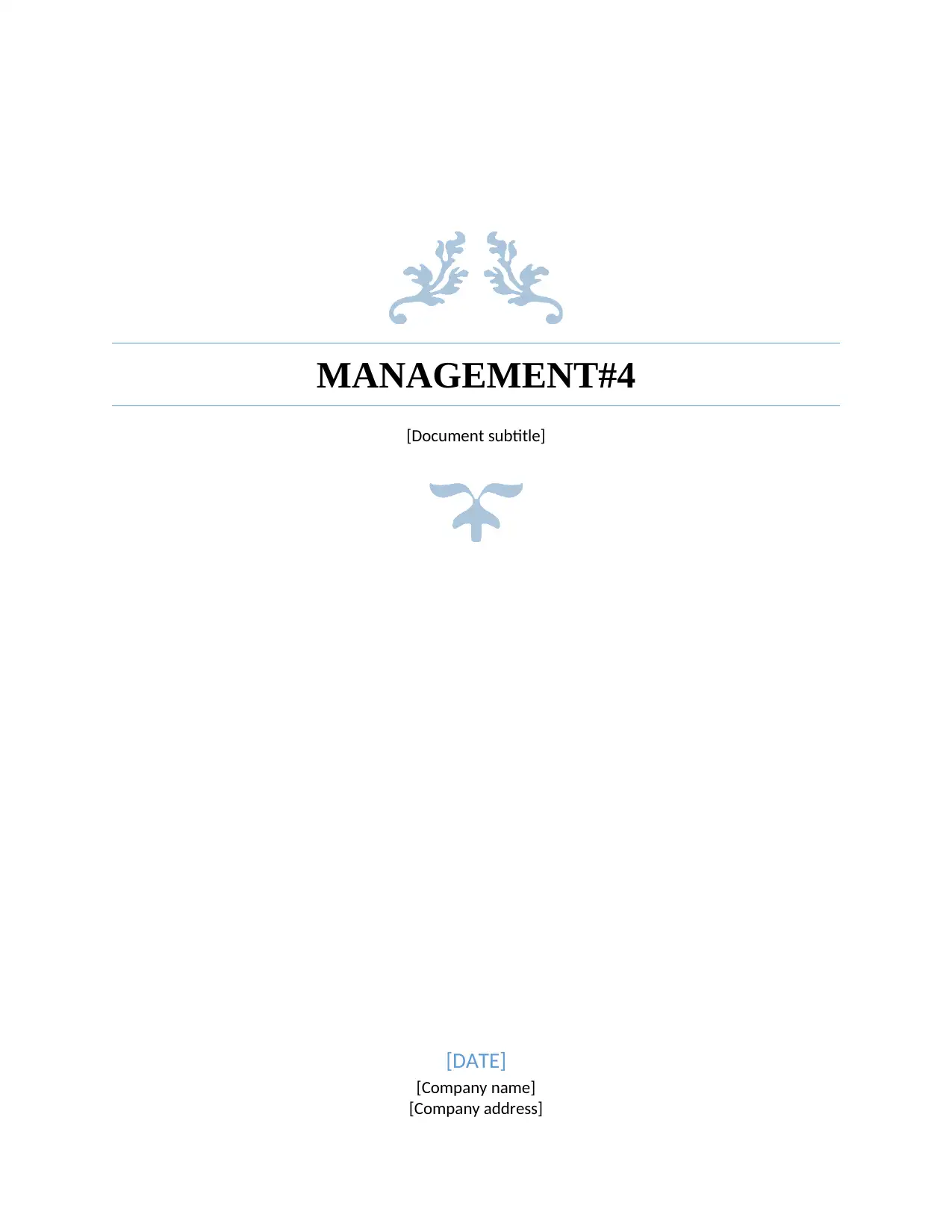
MANAGEMENT#4
[Document subtitle]
[DATE]
[Company name]
[Company address]
[Document subtitle]
[DATE]
[Company name]
[Company address]
Paraphrase This Document
Need a fresh take? Get an instant paraphrase of this document with our AI Paraphraser
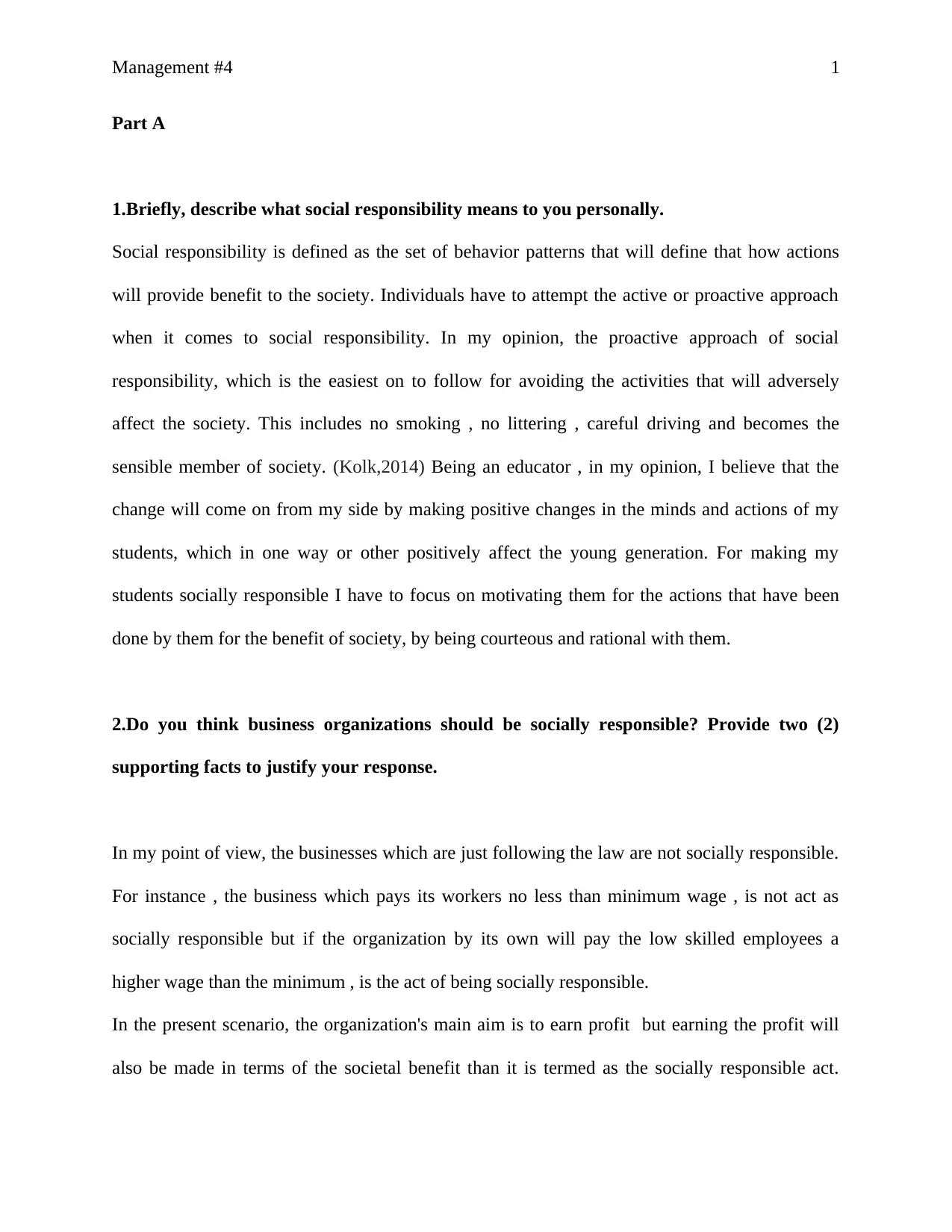
Management #4 1
Part A
1.Briefly, describe what social responsibility means to you personally.
Social responsibility is defined as the set of behavior patterns that will define that how actions
will provide benefit to the society. Individuals have to attempt the active or proactive approach
when it comes to social responsibility. In my opinion, the proactive approach of social
responsibility, which is the easiest on to follow for avoiding the activities that will adversely
affect the society. This includes no smoking , no littering , careful driving and becomes the
sensible member of society. (Kolk,2014) Being an educator , in my opinion, I believe that the
change will come on from my side by making positive changes in the minds and actions of my
students, which in one way or other positively affect the young generation. For making my
students socially responsible I have to focus on motivating them for the actions that have been
done by them for the benefit of society, by being courteous and rational with them.
2.Do you think business organizations should be socially responsible? Provide two (2)
supporting facts to justify your response.
In my point of view, the businesses which are just following the law are not socially responsible.
For instance , the business which pays its workers no less than minimum wage , is not act as
socially responsible but if the organization by its own will pay the low skilled employees a
higher wage than the minimum , is the act of being socially responsible.
In the present scenario, the organization's main aim is to earn profit but earning the profit will
also be made in terms of the societal benefit than it is termed as the socially responsible act.
Part A
1.Briefly, describe what social responsibility means to you personally.
Social responsibility is defined as the set of behavior patterns that will define that how actions
will provide benefit to the society. Individuals have to attempt the active or proactive approach
when it comes to social responsibility. In my opinion, the proactive approach of social
responsibility, which is the easiest on to follow for avoiding the activities that will adversely
affect the society. This includes no smoking , no littering , careful driving and becomes the
sensible member of society. (Kolk,2014) Being an educator , in my opinion, I believe that the
change will come on from my side by making positive changes in the minds and actions of my
students, which in one way or other positively affect the young generation. For making my
students socially responsible I have to focus on motivating them for the actions that have been
done by them for the benefit of society, by being courteous and rational with them.
2.Do you think business organizations should be socially responsible? Provide two (2)
supporting facts to justify your response.
In my point of view, the businesses which are just following the law are not socially responsible.
For instance , the business which pays its workers no less than minimum wage , is not act as
socially responsible but if the organization by its own will pay the low skilled employees a
higher wage than the minimum , is the act of being socially responsible.
In the present scenario, the organization's main aim is to earn profit but earning the profit will
also be made in terms of the societal benefit than it is termed as the socially responsible act.
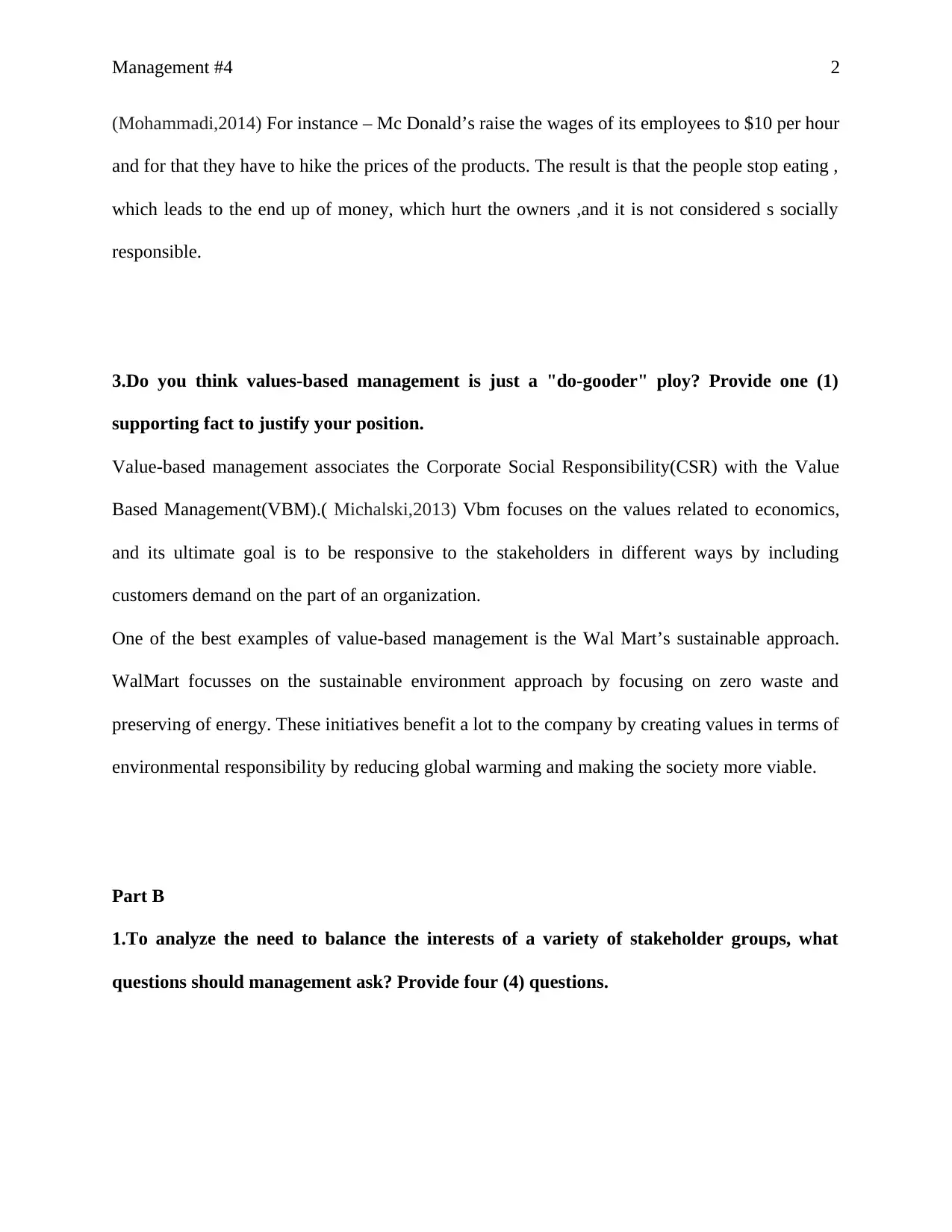
Management #4 2
(Mohammadi,2014) For instance – Mc Donald’s raise the wages of its employees to $10 per hour
and for that they have to hike the prices of the products. The result is that the people stop eating ,
which leads to the end up of money, which hurt the owners ,and it is not considered s socially
responsible.
3.Do you think values-based management is just a "do-gooder" ploy? Provide one (1)
supporting fact to justify your position.
Value-based management associates the Corporate Social Responsibility(CSR) with the Value
Based Management(VBM).( Michalski,2013) Vbm focuses on the values related to economics,
and its ultimate goal is to be responsive to the stakeholders in different ways by including
customers demand on the part of an organization.
One of the best examples of value-based management is the Wal Mart’s sustainable approach.
WalMart focusses on the sustainable environment approach by focusing on zero waste and
preserving of energy. These initiatives benefit a lot to the company by creating values in terms of
environmental responsibility by reducing global warming and making the society more viable.
Part B
1.To analyze the need to balance the interests of a variety of stakeholder groups, what
questions should management ask? Provide four (4) questions.
(Mohammadi,2014) For instance – Mc Donald’s raise the wages of its employees to $10 per hour
and for that they have to hike the prices of the products. The result is that the people stop eating ,
which leads to the end up of money, which hurt the owners ,and it is not considered s socially
responsible.
3.Do you think values-based management is just a "do-gooder" ploy? Provide one (1)
supporting fact to justify your position.
Value-based management associates the Corporate Social Responsibility(CSR) with the Value
Based Management(VBM).( Michalski,2013) Vbm focuses on the values related to economics,
and its ultimate goal is to be responsive to the stakeholders in different ways by including
customers demand on the part of an organization.
One of the best examples of value-based management is the Wal Mart’s sustainable approach.
WalMart focusses on the sustainable environment approach by focusing on zero waste and
preserving of energy. These initiatives benefit a lot to the company by creating values in terms of
environmental responsibility by reducing global warming and making the society more viable.
Part B
1.To analyze the need to balance the interests of a variety of stakeholder groups, what
questions should management ask? Provide four (4) questions.
⊘ This is a preview!⊘
Do you want full access?
Subscribe today to unlock all pages.

Trusted by 1+ million students worldwide
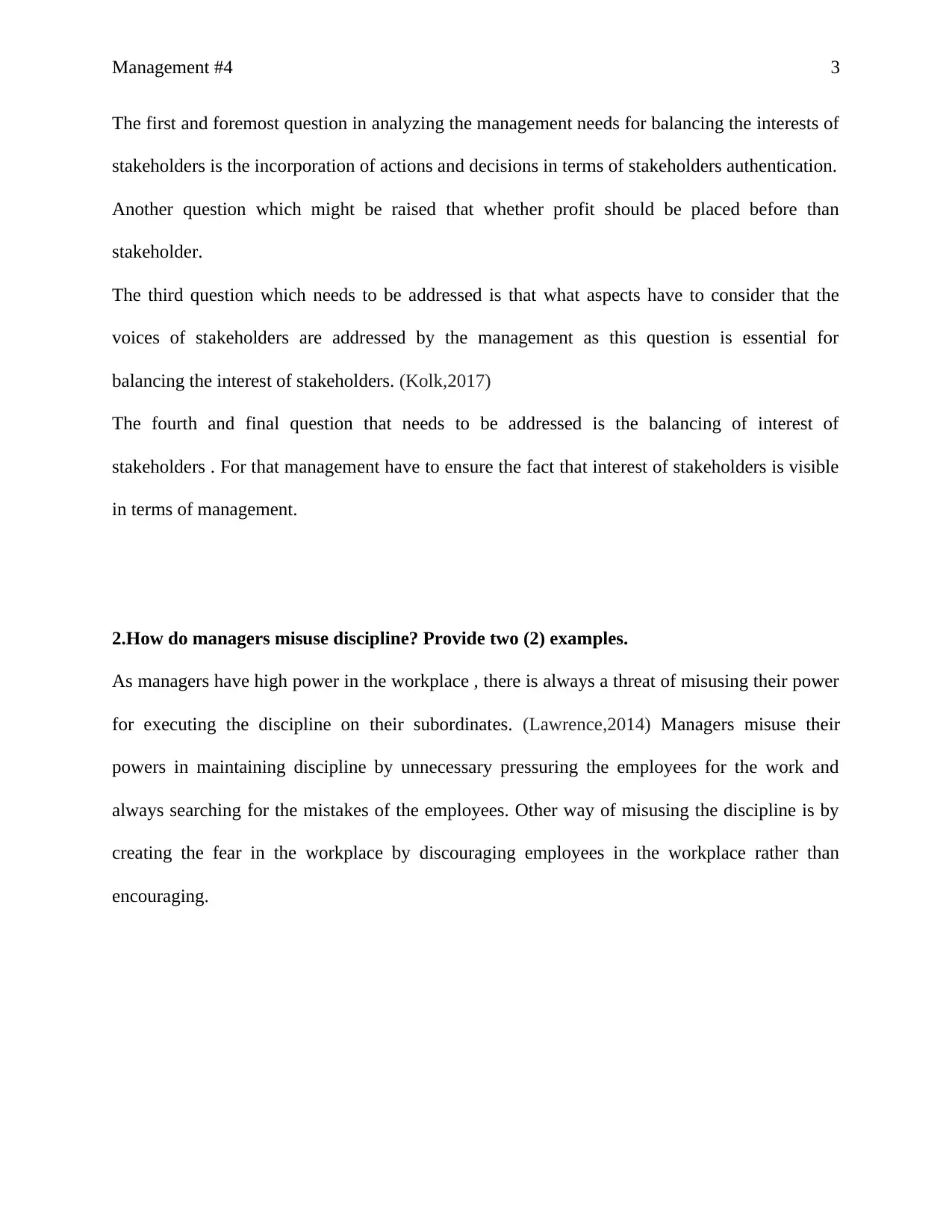
Management #4 3
The first and foremost question in analyzing the management needs for balancing the interests of
stakeholders is the incorporation of actions and decisions in terms of stakeholders authentication.
Another question which might be raised that whether profit should be placed before than
stakeholder.
The third question which needs to be addressed is that what aspects have to consider that the
voices of stakeholders are addressed by the management as this question is essential for
balancing the interest of stakeholders. (Kolk,2017)
The fourth and final question that needs to be addressed is the balancing of interest of
stakeholders . For that management have to ensure the fact that interest of stakeholders is visible
in terms of management.
2.How do managers misuse discipline? Provide two (2) examples.
As managers have high power in the workplace , there is always a threat of misusing their power
for executing the discipline on their subordinates. (Lawrence,2014) Managers misuse their
powers in maintaining discipline by unnecessary pressuring the employees for the work and
always searching for the mistakes of the employees. Other way of misusing the discipline is by
creating the fear in the workplace by discouraging employees in the workplace rather than
encouraging.
The first and foremost question in analyzing the management needs for balancing the interests of
stakeholders is the incorporation of actions and decisions in terms of stakeholders authentication.
Another question which might be raised that whether profit should be placed before than
stakeholder.
The third question which needs to be addressed is that what aspects have to consider that the
voices of stakeholders are addressed by the management as this question is essential for
balancing the interest of stakeholders. (Kolk,2017)
The fourth and final question that needs to be addressed is the balancing of interest of
stakeholders . For that management have to ensure the fact that interest of stakeholders is visible
in terms of management.
2.How do managers misuse discipline? Provide two (2) examples.
As managers have high power in the workplace , there is always a threat of misusing their power
for executing the discipline on their subordinates. (Lawrence,2014) Managers misuse their
powers in maintaining discipline by unnecessary pressuring the employees for the work and
always searching for the mistakes of the employees. Other way of misusing the discipline is by
creating the fear in the workplace by discouraging employees in the workplace rather than
encouraging.
Paraphrase This Document
Need a fresh take? Get an instant paraphrase of this document with our AI Paraphraser
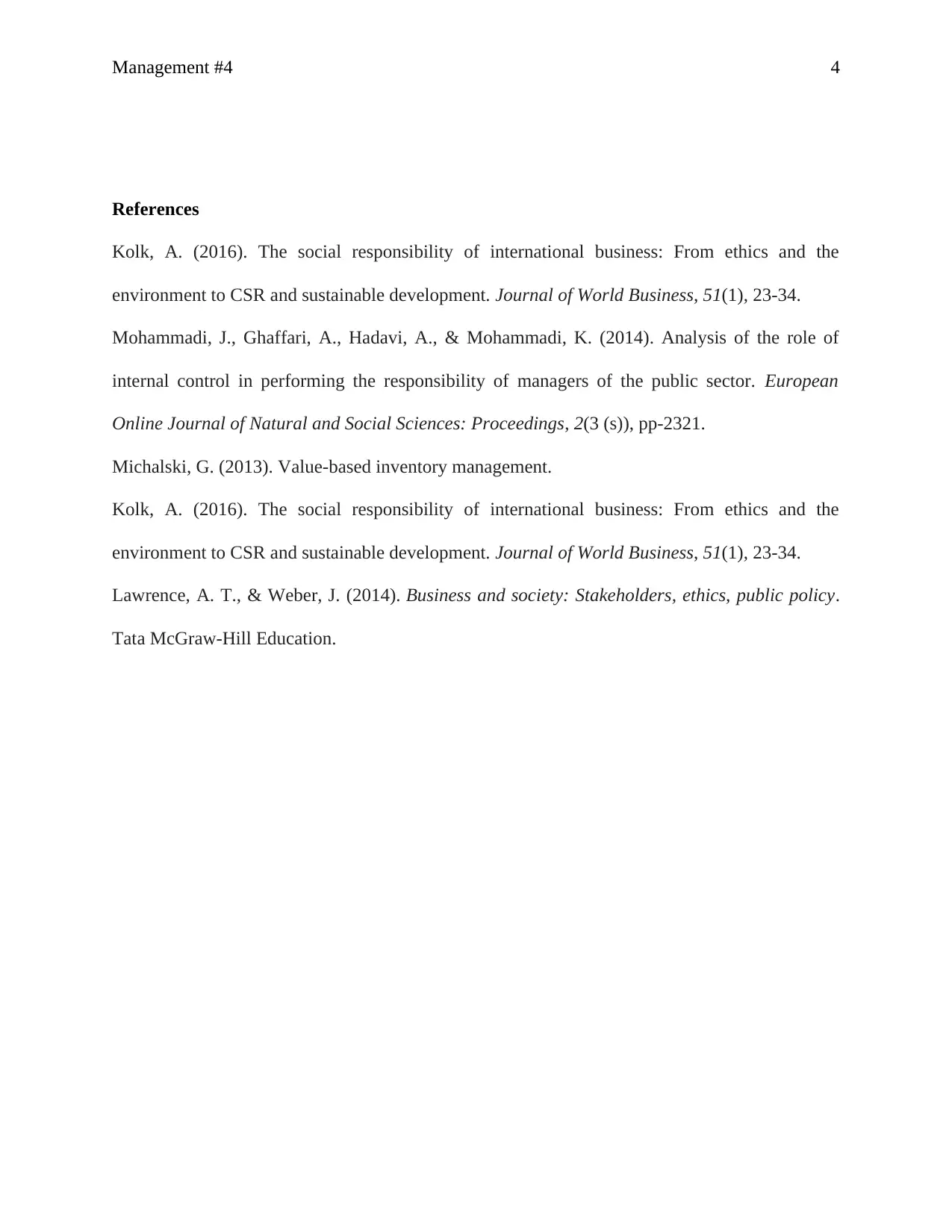
Management #4 4
References
Kolk, A. (2016). The social responsibility of international business: From ethics and the
environment to CSR and sustainable development. Journal of World Business, 51(1), 23-34.
Mohammadi, J., Ghaffari, A., Hadavi, A., & Mohammadi, K. (2014). Analysis of the role of
internal control in performing the responsibility of managers of the public sector. European
Online Journal of Natural and Social Sciences: Proceedings, 2(3 (s)), pp-2321.
Michalski, G. (2013). Value-based inventory management.
Kolk, A. (2016). The social responsibility of international business: From ethics and the
environment to CSR and sustainable development. Journal of World Business, 51(1), 23-34.
Lawrence, A. T., & Weber, J. (2014). Business and society: Stakeholders, ethics, public policy.
Tata McGraw-Hill Education.
References
Kolk, A. (2016). The social responsibility of international business: From ethics and the
environment to CSR and sustainable development. Journal of World Business, 51(1), 23-34.
Mohammadi, J., Ghaffari, A., Hadavi, A., & Mohammadi, K. (2014). Analysis of the role of
internal control in performing the responsibility of managers of the public sector. European
Online Journal of Natural and Social Sciences: Proceedings, 2(3 (s)), pp-2321.
Michalski, G. (2013). Value-based inventory management.
Kolk, A. (2016). The social responsibility of international business: From ethics and the
environment to CSR and sustainable development. Journal of World Business, 51(1), 23-34.
Lawrence, A. T., & Weber, J. (2014). Business and society: Stakeholders, ethics, public policy.
Tata McGraw-Hill Education.
1 out of 5
Related Documents
Your All-in-One AI-Powered Toolkit for Academic Success.
+13062052269
info@desklib.com
Available 24*7 on WhatsApp / Email
![[object Object]](/_next/static/media/star-bottom.7253800d.svg)
Unlock your academic potential
Copyright © 2020–2026 A2Z Services. All Rights Reserved. Developed and managed by ZUCOL.





